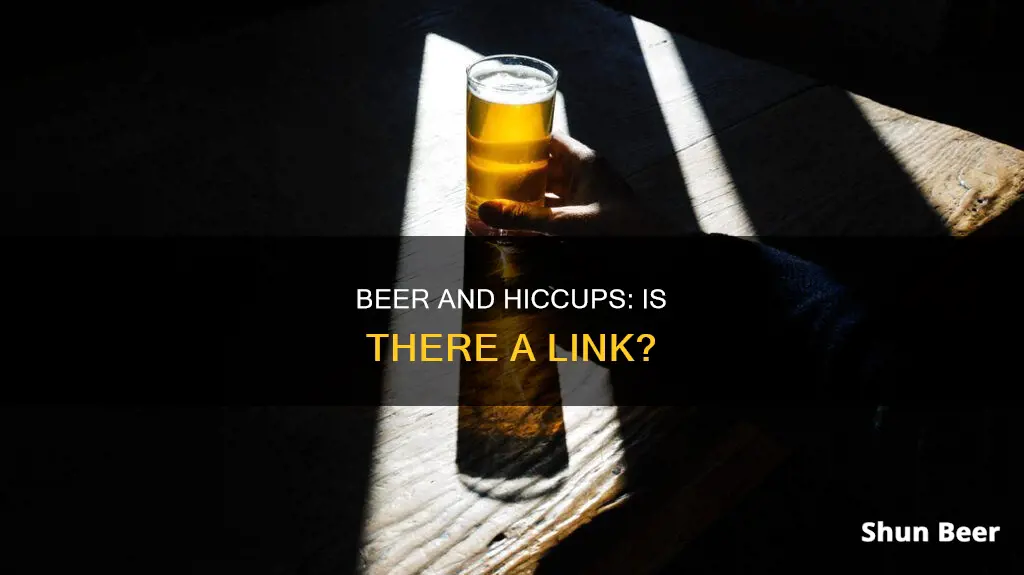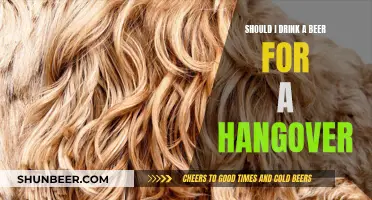
Drinking beer can indeed cause hiccups, and it is widely regarded as one of the worst beverages for triggering them. Hiccupping when drinking alcohol is a common occurrence, and while it is typically harmless, it can be bothersome and irritating. Hiccups are involuntary contractions of the diaphragm, the muscle responsible for breathing, followed by a sudden closure of the vocal cords, resulting in the characteristic hic sound. When drinking alcohol, several factors can trigger hiccups, including irritation of the phrenic nerve, changes in carbon dioxide levels, gastroesophageal reflux, and stimulation of the vagus nerve.
| Characteristics | Values |
|---|---|
| Cause of hiccups | Involuntary contractions of the diaphragm muscle |
| Hiccups sound | Produced by the sudden closure of the vocal cords |
| Alcohol's effect on hiccups | Irritates the nerves that control the diaphragm, including the phrenic nerve |
| Alcohol's effect on the body | Alcohol is a central nervous system depressant that can alter nerve cell functioning and relax muscles in the body, including the diaphragm |
| Hiccups duration | Usually short-lived, lasting a few minutes to a few hours |
| Chronic hiccups | Hiccups lasting longer than 48 hours may indicate an underlying health condition and require medical attention |
| Hiccups remedies | Holding breath, drinking water, breathing techniques, stimulating the back of the throat, etc. |
| Hiccups prevention | Avoid carbonated drinks, drink slowly, drink in moderation, eat before drinking, etc. |
What You'll Learn

Irritation of the phrenic nerve
Alcohol can irritate the phrenic nerve in several ways. Firstly, it can cause a relaxation of the diaphragm muscle, leading to irritation of the phrenic nerve. This irritation results in the spasmodic contractions characteristic of hiccups. Additionally, alcohol may stimulate the release of gastric acid in the stomach, leading to acid reflux, which can further irritate the diaphragm and trigger hiccups.
The vagus nerve also plays a crucial role in the hiccup reflex. Alcohol consumption can stimulate the vagus nerve, which regulates various bodily functions, including digestion. Furthermore, the irritation of the stomach and oesophagus by alcohol can stimulate the vagus nerve, as it runs close to these areas. This stimulation can then trigger hiccups.
While hiccups after drinking alcohol are typically harmless and temporary, they can be bothersome and may indicate an underlying health condition in rare cases. If hiccups persist for an extended period or are accompanied by other symptoms, it is advisable to seek medical assistance.
To alleviate alcohol-induced hiccups, various techniques can be employed, such as breathing exercises, drinking water or non-alcoholic beverages, and holding your breath. Additionally, consuming alcohol in moderation and avoiding carbonated or high-sugar drinks can help prevent hiccups.
Beer and Braces: Ceramic Care and Drinking
You may want to see also

Carbonation and stomach distension
Drinking large amounts of liquid, especially quickly, can also lead to stomach distension, which can impact the diaphragm and cause hiccups. The stomach sits just beneath the diaphragm, so when it becomes distended, it can press on or irritate the diaphragm, triggering spasmodic contractions and resulting in hiccups. This is further exacerbated when drinking is accompanied by talking, dancing, or other activities that can lead to swallowing air, which contributes to stomach distension.
To prevent hiccups caused by carbonation and stomach distension, it is advisable to avoid carbonated alcoholic drinks and to sip drinks slowly, avoiding excessive consumption. Additionally, eating before and during drinking can help slow down alcohol absorption and maintain steady blood sugar levels, reducing the risk of hiccups.
Beer and Prozac: Safe Mix or Risky Business?
You may want to see also

Irritation of the oesophagus and stomach
Drinking beer can irritate the oesophagus and stomach, which can cause hiccups. Alcohol is a proven gut irritant and can irritate the nerves that control the diaphragm, including the phrenic nerve. This irritation can lead to spasms and contractions of the diaphragm, which cause hiccups.
The vagus nerve, which plays a role in regulating various bodily functions, including digestion, can also be stimulated by alcohol consumption, causing hiccups. The irritation of the diaphragm and surrounding nerves increases the likelihood of hiccups.
Additionally, drinking carbonated alcoholic beverages can further increase the likelihood of hiccups due to the gas bubbles irritating the diaphragm. The gas in carbonated drinks can cause the stomach to distend or swell, putting pressure on the diaphragm. This irritation can then trigger hiccups.
Consuming large amounts of alcohol can also lead to stomach distension, which can irritate the diaphragm and surrounding nerves, triggering hiccups. Binge drinking or consuming alcohol too quickly can cause bloating and distension of the stomach, increasing the likelihood of hiccups.
While the exact mechanism of how alcohol triggers hiccups is not fully understood, it is believed that the relaxation of the diaphragm muscle caused by alcohol can lead to irritation of the phrenic nerves. This irritation results in the spasmodic contractions characteristic of hiccups.
Furthermore, alcohol may stimulate the release of gastric acid in the stomach, leading to acid reflux. The refluxed acid can irritate the diaphragm, causing it to contract involuntarily and resulting in hiccups.
In most cases, hiccups caused by drinking beer are temporary and harmless, resolving independently within a few minutes to a few hours. However, if hiccups persist for an extended period or are accompanied by other symptoms, it is recommended to seek medical attention.
Drinking Beer at the Park: Is It Legal?
You may want to see also

Gastroesophageal reflux
Drinking alcohol can increase the risk of developing gastroesophageal reflux due to its effects on the muscles in the body, including the diaphragm and the lower oesophageal sphincter (LES). Alcohol is a central nervous system depressant that can alter the normal functioning of nerve cells and cause muscles in the body to relax. This includes the diaphragm and the LES, which plays a role in breathing and protecting the oesophagus from the highly acidic secretions of the stomach. When the LES relaxes, it compromises the tight seal against stomach acid, allowing acid from the stomach to come back up into the oesophagus.
In addition, alcohol may stimulate the release of gastric acid in the stomach, leading to acid reflux. The refluxed acid can then irritate the diaphragm, causing it to contract involuntarily and resulting in hiccups. Alcohol can also irritate the nerves that control the diaphragm, including the phrenic nerve, leading to spasms and hiccups. Furthermore, alcohol consumption can affect carbon dioxide levels in the body, and increased levels of carbon dioxide can stimulate the diaphragm, leading to hiccups.
Research has shown that drinking alcohol, especially in large quantities, is linked to an increased risk of gastroesophageal reflux. A 2019 review of 29 studies found that increasing alcohol intake and drinking frequency demonstrated a stronger link with gastroesophageal reflux. Another review from 2017 also concluded that alcohol decreases the pressure of the LES, allowing acid from the stomach to flow back up into the oesophagus.
However, the relationship between alcohol consumption and gastroesophageal reflux is complex and not yet fully understood. Some studies have found conflicting results, with a Swedish study concluding that alcohol consumption was not associated with any change in the risk of gastroesophageal reflux. Furthermore, the cessation of alcohol consumption did not improve oesophageal pH profiles or reduce symptoms in that particular study.
In summary, while drinking alcohol is a known risk factor for gastroesophageal reflux, the underlying mechanisms are not yet fully elucidated. The effects of alcohol on the muscles and nerves involved in breathing and digestion, as well as its potential impact on gastric acid secretion, all contribute to the development of gastroesophageal reflux. More well-designed prospective studies are needed to clarify the effect of alcohol on this condition.
Beer Consumption: Implications on Gallbladder Health
You may want to see also

Stimulation of the vagus nerve
The vagus nerve plays a crucial role in regulating various bodily functions, including digestion. Alcohol consumption can stimulate the vagus nerve, leading to hiccups. This is due to the fact that the vagus nerve is located near the stomach and esophagus, which can become irritated when drinking alcohol, especially if consumed rapidly or in large quantities. This irritation can then stimulate the vagus nerve, resulting in hiccups.
Furthermore, alcohol can cause the muscles in the body to relax, including the diaphragm, which is the muscle responsible for breathing and plays a major role in the hiccup reflex. When the diaphragm is relaxed due to alcohol consumption, it can lead to irritation of the phrenic nerves, which control the movement of the diaphragm. This irritation results in spasmodic contractions, causing hiccups.
In addition to irritating the phrenic nerves, alcohol may also stimulate the release of gastric acid in the stomach, leading to acid reflux. The refluxed acid can then irritate the diaphragm, causing it to contract involuntarily and resulting in hiccups.
While hiccups after drinking alcohol are typically temporary and harmless, they can be bothersome and inconvenient, especially when they persist for an extended period of time. If hiccups continue for more than 48 hours or are accompanied by other symptoms, it is recommended to seek medical attention as it may indicate an underlying health condition such as gastroesophageal reflux disease (GERD), nerve damage, or gastrointestinal disorders.
To alleviate alcohol-induced hiccups, there are several simple techniques that can be employed:
- Breathing techniques: Regulating breathing patterns and relaxing the diaphragm through deep breathing exercises can help stop hiccups.
- Drinking water or non-alcoholic beverages: Sipping water or non-alcoholic drinks slowly can help stimulate the vagus nerve, potentially interrupting the hiccup reflex. It is important to avoid carbonated or fizzy drinks as they can aggravate hiccups.
- Holding breath: Increasing carbon dioxide levels in the bloodstream by holding one's breath can interrupt the hiccup reflex.
- Valsalva maneuver: Forcefully exhaling against a closed airway by closing the mouth, pinching the nose shut, and breathing out.
Beer After a CT Scan: What You Need to Know
You may want to see also







